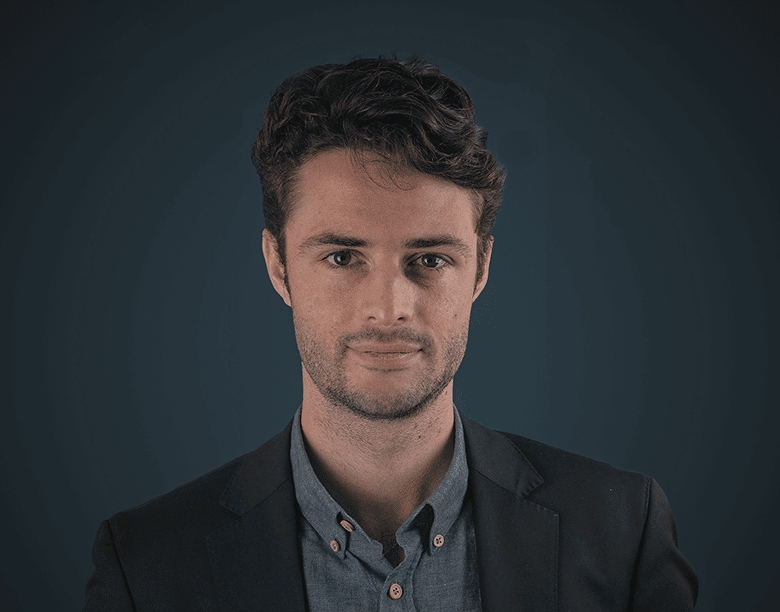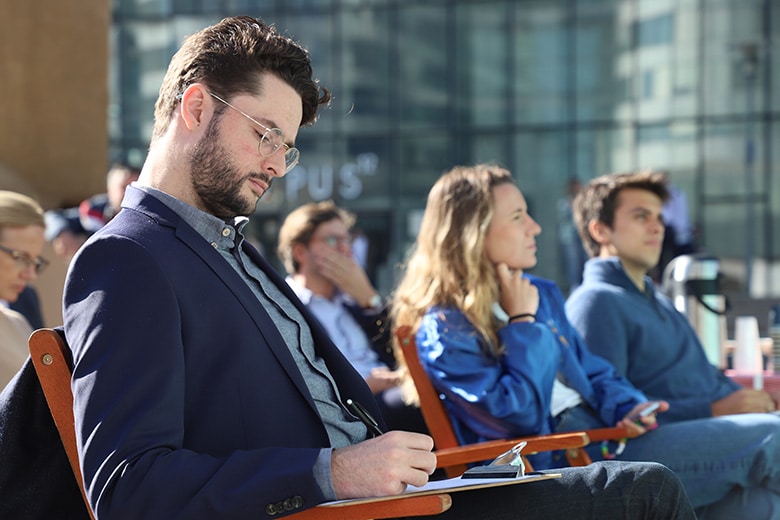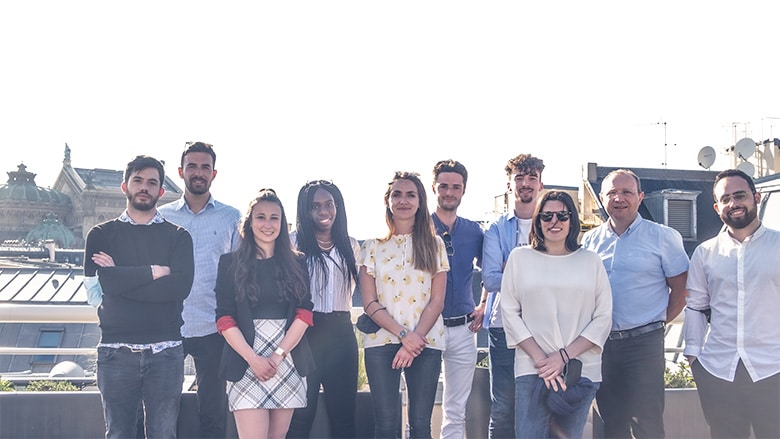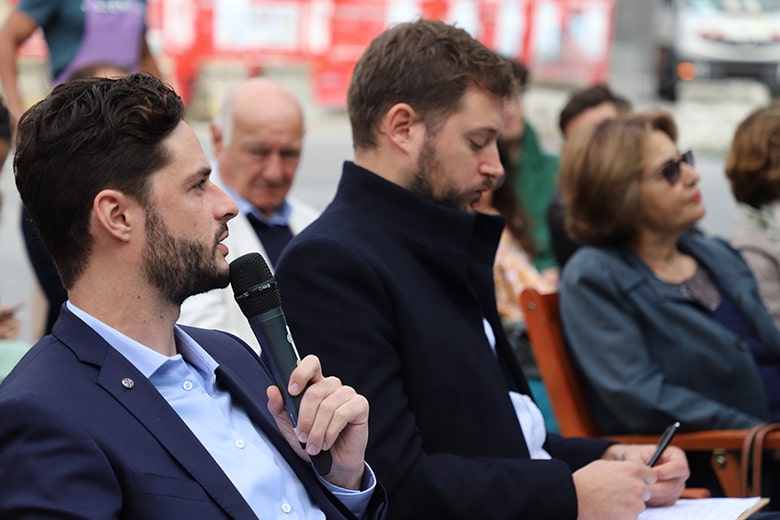ADRIEN FENECH (EPITA CLASS OF 2016), PRESIDENT OF ESTIMEO: “IF YOU DON’T TRY, YOU WON’T SUCCEED!”
In 2017, Estimeo was launched in France with the goal of changing start-up valuation methods. A bold and unprecedented challenge that now, a few years later, seems to have been met, as Estimeo has expanded its activities well beyond France. Behind this growing success is Adrien Fenech (EPITA class of 2016), co-founder and now president of this increasingly important player in the start-up ecosystem. Recently selected by Forbes France as one of the 30 French individuals under the age of 30 who are revolutionizing their respective sectors, this Alumnus looks back at the inception and development of his company. In his opinion, Estimeo’s success is far from being just a critical success!

At EPITA, you can study to become an engineer in many fields. However, you decided to become an entrepreneur at the end of your studies. What led you to choose this path?
Adrien Fenech: This dates back to my end-of-studies internship. In general – and this is why we are so lucky at EPITA – this final year internship usually turns into a permanent contract. My internship was in a consulting firm, where I worked on R&D and focused on very interesting and highly technical subjects. I really enjoyed myself, but when it came time to sign my permanent contract, I understood that the company wanted me to focus on consulting and have me work for one of their clients. It would have been a classic 9 to 5 job, often common in these big consulting companies, which I really didn’t want to do.
Fortunately, at the same time, Florian Bercault, an old acquaintance of mine whom I met through EPITA, spoke to me about a start-up project he was launching. I was quite unfamiliar with the world of start-ups. When he explained his project to me, I really didn’t understand anything at all! (laughs) However, what was certain was that I knew Florian and that he would go far. So, I made the decision to join him. I threw myself into the project, heart and soul, knowing that, as I was just graduating from school, I had absolutely nothing to lose… and I’m still here today!
How did you meet Florian Bercault, with whom you launched Estimeo?
Adrien Fenech: It was in 2014, when I was in my 3rd year of school and the first year of my engineering cycle. EPITA had selected a few students to take part in the Cité de la Réussite, an event in which the IONIS Group is a partner. This forum offers conferences and debates at the Sorbonne with major personalities, such as CAC 40 bosses, scientists, politicians, etc.
As one of the few selected, I was able to participate in a session, preparing questions to be addressed to the Boston Consulting Group, alongside students from other schools. That’s where I met Florian, who was to become my partner. He was a student at Sciences Po and HEC.
After the Cité de la Réussite forum, we kept in touch yearly, wishing each other a happy new year. And after three years, he contacted me and told me that he was looking for someone with a technological background to assist him in his entrepreneurial adventure. He then invited me to eat sushi and I said yes! (laughs)
It’s that simple. We then became a tech and business duo, which is highly sought after in the entrepreneurial world, especially in France. This allowed us to develop Estimeo and especially Estimeo as we know it today.

Does the first version of Estimeo, the “V.1” of the project, look like the one today?
Adrien Fenech: Absolutely not! Everything has changed many times and for many reasons. The first is that when we left school, we saw the business world and the entrepreneurial world in a light that is very different from reality. Obviously, we had to correct this somewhat candid view.
Another reason is the very nature of the entrepreneurial world, which is constantly evolving. It’s the famous “start-up nation” which, due to recent policies, has been quickly transformed over a very short period of time. Since Estimeo is at the heart of this world, the project has had to evolve with it.
So, if at the beginning we were a simple company that provided automatic ratings for start-ups, we decided to add a more human dimension to our analysis as we went along, going against the current of this tech expansion, to finally no longer focusing on ratings. We are now positioned in the field of company valuation, and also provide consulting services. In fact, our company has really reinvented itself over time, offering something new every year. For example, although we work mainly in France and England, we are also present throughout Europe, whereas a few years ago, we were focused on France, and mainly on Paris and the greater Paris region.
When two people launch a start-up project, they usually take on many roles in the beginning. Has your role also evolved within the company over the years?
Adrien Fenech: Yes, my role has evolved quite a bit! During the first few years, I was CTO, which is a big word in the start-up world as compared to the same role in large companies. In a new structure, you don’t have the same responsibilities as in a company with many employees.
Still, I had to focus on developing the company’s core program as well as direct the somewhat technical strategy to follow. This also meant that I had to participate in the business aspect in order to understand it well and manage our teams, even if my partner and I shared this role.
Then, as time went on, my role changed. I started writing less and less code for Estimeo and instead, worked on business strategies, while being increasingly involved in representing the company at events, trade shows, conferences, etc. This led me to become President of Estimeo, a position I’ve held since July 2022. And as president, I mainly focus on strategy and the company’s image, especially during meetings with partners. I negotiate large contracts, and tenders. And, although this takes a lot of time, I still try to work on more technical aspects one or two hours a day.
When Estimeo was founded, its market did not exist. It was a sort of missing link in the start-up ecosystem…
Adrien Fenech: That’s true, and it’s precisely this aspect of Estimeo that motivated me from the beginning as we had to start from scratch. When you launch something unique, you can tell yourself that you have the advantage of being the first and that, inevitably, the product will rapidly be adopted. We should then logically capture the entire market share. Except that customers do not necessarily expect someone to resolve a problem that they have not yet identified or formulated!
When you come up with this kind of solution, there is a necessary phase in which you must promote market awareness: “You may not have identified it, but I can assure you that you have this problem, and we have found the solution.” It’s a very educational phase in the end. It’s not just a matter of “I develop a solution and sell it”: you have to prepare the groundwork beforehand, so that you can then optimally sell your solution, and that’s where the challenge lies. We had to convince our clients and future clients. We also had to understand the current issues of the market, the investment world and entrepreneurship in general.
Clearly, we did not have the keys to solve these problems directly. Instead, we had to find the correct lock ourselves and invent the key that opened it. Today, these are the keys that we give to our partners… and our competitors as well, because it remains a group dynamic. It is important that there are competitors, but we must stay on top of the game. Having more competitors instills a real dynamic in the market and signifies that the problem is real and that, potentially, we will be able to sell our expertise to more clients. The idea is to pull all players behind us so that everyone benefits.

Who are Estimeo’s customers today? Business angels? The start-ups themselves?
Adrien Fenech: As we are at the heart of this ecosystem, all stakeholders in the life cycle of a start-up could be our clients: we must simply choose who we initially target. Obviously, our first customers are the start-ups themselves, who will purchase valuation reports or coaching sessions. From there, we will then develop the rest of our network, with business angels and investment funds that are also interested in our analyses, which show the value of the start-ups that they would potentially like to invest in.
We will also have large corporations or major brands that will call on us in order to assess the reliability of a start-up and see if it will still exist in 6 months or a year, before setting up a partnership. We will also have incubators and accelerators that measure the promotional performance of start-ups. For example, I will analyze them at the beginning of the promotion, and then six months later, to see if their value has increased, thanks to the incubator. Finally, we’ll also work with banks that wish to receive a more in-depth analysis of the start-up before giving them a loan.
The project started in 2016 and the company was founded in 2017. What have been its key milestones since its inception?
Adrien Fenech: There have been several milestones in the history of Estimeo where we have said to ourselves “Wow, we’ve managed to do something great”. The very first one was our first partnership, signed with a major bank to provide all its regional branches with start-up analysis tools. This was a huge step forward for us. All of a sudden, we started talking to “C-levels”, the top executives of a bank at the global level, in this case the entire innovation department of a bank. We’re talking about people who manage thousands of jobs and whose decisions potentially cost millions of euros, and even more… It was quite impressive to sign a partnership agreement with such giants and to see these people suddenly consider us, with our small company of a few employees, as their equals.
Another milestone in our history was the launch of Estimeo in London. We decided to set up a team dedicated to this completely different and new market for us, with orders of magnitude different from those in France – more numerous, and above all, more significant investments. We then chose to give the company an international dimension and spent a lot of time going back and forth to London. This was a different challenge from those we have experienced up to now.
Finally, the last step was when my partner Florian left the company two years ago, after having been elected mayor of Laval in Mayenne. This represented both the departure of the president and the person who had nurtured Estimeo from the very beginning, and set up the business with me… It was his baby at the start! Logically, everyone’s first instinct was to panic: our shareholders panicked; I panicked a little too… But in fact, everything went well. We realized that the company was structured well enough to function normally. Even though Florian was leaving, the shareholders finally took the news in stride, and we continued to grow. This shows us that we are no longer the small start-up that was just starting out and in danger of collapsing overnight. We are now relatively stable and recognized in the ecosystem. That’s a real source of satisfaction!
Speaking of success, how do you feel about being on the Forbes 30 under 30 list?
Adrien Fenech: Honestly, I see it as an honor, even though it was very close – I received the news 3 days before my 30th birthday! (laughs) You have to understand that Forbes France is a very special magazine. Launched by Dominique Busso a few years ago, it is one of the rare publications that has a “royal” impact on the world of entrepreneurship. Of course, being ranked is always positive, but the list drawn up by Forbes represents something extra in our ecosystem.
Moreover, it doesn’t only include entrepreneurs: it’s the 30 people under 30 who are trying to make things happen or who are carrying out actions that have an impact in France, in the broadest sense. For example, there is Arthur Auboeuf, the co-founder of Time for the Planet, a great investment fund based on criteria that will impact the future. There are also actors, singers, Olympic medalists… It’s obviously impressive to find myself in the same ranking as them, and it means a lot to me. A little anecdote… When my parents saw the list, they thought it was great, without even being aware of the impact that this ranking could have in the world of entrepreneurship: they were just proud to see their son there! (laughs)

You mentioned the case of Time for the Planet. Since the beginning of Estimeo, the question of sustainability has taken on another dimension, including at EPITA, which became a company with a mission in 2021. Do you also take this dimension into account at Estimeo?
Adrien Fenech: Absolutely. It’s even something that we started dealing with before we were asked to. In our DNA, it has always been important to take into account the “ESG” criteria, i.e., ecological, social and governance issues. And today, we continue to do so, especially as these criteria are now increasingly requested by start-ups themselves as well as investors. For example, more and more investment funds are asking for an ESG rating before investing in companies. Until now, this has been very common for European rating agencies at the level of SMEs and SMIs, but it was still not clear for start-ups. For us, this represents a new level of awareness.
Since its beginnings, Estimeo has continued to grow, moving as you said from Paris to Europe. How far do you plan to expand?
Adrien Fenech: Obviously, like many other companies, we dream of going global and being present throughout the world. However, there are two main paths that will influence the rest of the adventure. On the one hand, we can choose the “royal route” and head to the United States, which represents a huge market for entrepreneurship and start-ups, or target the Asian sector, which is another world entirely.
And there is also another way of looking at things: we can say that we should, on the contrary, go and help emerging countries. For example, there are many start-ups in Africa and more and more initiatives are being created in South America. So, we still have a lot of work to do in this area. In any case, this question will arise. But of course, in the long term, our goal is to continue to grow, and eventually succeed in developing elsewhere. The only questions are where and in which order.
Finally, what advice would you give to current and future EPITA students?
Adrien Fenech: My advice would be to take your chances and, above all, avoid anonymity. Why do I say this? For the simple reason that at EPITA, I was far from being the best: I was average and therefore, totally anonymous. Except that I absolutely wanted to stand out from the crowd. So I started to become involved in associations, first managing the Students’ Bureau (BDE), then I started to work as an assistant professor with new classes, and new students, etc. This is also how I ended up participating in the Cité de la Réussite.
Through these different experiences, I tried to stand out in my class, knowing that I could not rely only on my knowledge and my grades. I ventured out and became involved in associations, and started giving classes – in fact, I still give classes at EPITA and in other schools and universities today -, I dared to set up a company and hence take risks. And in the end, it pays off. Of course, taking risks also means taking responsibility, but in any case, if you don’t try, you won’t succeed!

